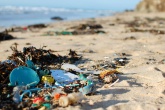Plastic cotton buds to be banned by two UK supermarket chains
Two of the UK’s largest supermarkets, Tesco and Sainsbury’s, are planning to ban plastic cotton buds in a bid to fight marine plastic pollution, also pledging to replace the plastic stems of the cotton buds with paper by the end of 2017 in their own brand products.
Plastic cotton buds contribute greatly to marine pollution, making up over 60 per cent of sewage-related beach litter. The plastic stems are often confused for food by sea creatures, which means they enter the marine food web, even winding up on our dinner plates. The Department of Health is set to review the impact of these plastics on human health following an inquiry by the Environmental Audit Committee (EAC).
The decision taken by Tesco and Sainsbury’s follows the precedent set by Waitrose, the Co-operative and Johnson & Johnson in committing to bringing in paper stems, pushed into action by City to Sea’s #switchthestick campaign (also supported by campaigning group 38 Degrees) to reduce plastic cotton bud pollution. Morrisons and Boots are currently also considering a plastic ban, and Asda yesterday (1 December) announced that it too would be banning plastic stems.
A “huge win in the fight against marine plastic pollution”
Speaking about the ban, a spokesman for Sainsbury’s said: “We have been working hard to improve this product. Our new cotton buds, with 100 per cent biodegradable stems, will be available before the end of 2017.”
Meanwhile, a spokesman for Tesco said: “We’re committed to ensuring all of our own label cotton bud products will be made with paper stems, and will do this by the end of 2017.”
Natalie Fee, Founder of City to Sea’s #switchthestick campaign to cut plastic pollution, said: “We’re delighted with the announcements to ‘switch the stick’ from plastic to paper stem buds. Whilst they still shouldn’t be flushed, this move will stop millions of plastic stems ending up in the marine environment each year and is a huge win in the fight against marine plastic pollution.”
Emma Cunningham, of the Marine Conservation Society, said: “These are great commitments from Tesco and Sainsbury’s, but we’d like to see much more prominent ‘don’t flush’ labelling on cotton bud sticks... We found over 23 [plastic] cotton bud sticks on every 100m of beaches we cleaned in September. The message is clear: only pee, poo and paper should go down the loo.”
The fight against marine plastic pollution continues
The announcements by Tesco and Sainsbury’s that they will be banning plastic cotton buds come as the issue of marine plastic continues to gain public attention and efforts to reduce it continue to increase.
Results from the 2016 Great British Beach Clean last week (22 November) revealed that the number of plastic carrier bags found on UK beaches has almost halved in the last year, thanks to the introduction of the 5p plastic bag charge in supermarkets, which has seen an 85 per cent reduction of single-use plastic bag purchases in the UK.
In September, moreover, Environment Secretary Andrea Leadsom announced that the UK government plans on banning the sale and manufacture of products containing microbeads, tiny pieces of plastic too small to be caught by filtration systems that pose a threat to marine wildlife through their ingestion. Eunomia Research & Consulting estimates that 950,000 tonnes of microplastics enter the ocean every year.
More information about City to Sea’s #switchthestick campaign is available on the campaign’s website.









